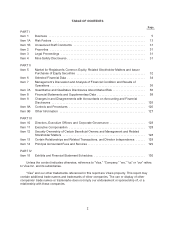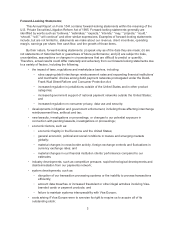Visa 2013 Annual Report Download - page 19
Download and view the complete annual report
Please find page 19 of the 2013 Visa annual report below. You can navigate through the pages in the report by either clicking on the pages listed below, or by using the keyword search tool below to find specific information within the annual report.positioned competitively, due to our global brand, our broad set of Visa-branded payment products and
our proven track record of processing payment transactions securely and reliably through VisaNet.
Employees
At September 30, 2013, we employed approximately 9,500 persons worldwide. We consider our
relationships with our employees to be good.
Government Regulation
Interchange reimbursement fees. We have historically set default debit interchange
reimbursement rates in the United States and many other geographies. During fiscal 2012, the Federal
Reserve implemented new rules under the Dodd-Frank Act, setting a cap on the maximum U.S. debit
interchange reimbursement fee assessed for debit products issued by large financial institutions.
These rules continue to have an adverse impact on our pricing, reduce the number and volume of U.S.
debit transactions we process and decrease our associated revenues. As a result, we have
significantly modified our debit strategy and continue to renegotiate some portions of our contracts with
our financial institution clients. In July 2013, a federal court invalidated the newly implemented rules,
finding that the Federal Reserve improperly considered certain costs in setting a cap on the maximum
debit interchange reimbursement rate and that issuers must make at least two unaffiliated networks
available for processing each electronic debit transaction, regardless of authorization method. Although
the court ordered the Federal Reserve to revise the rules, it stayed that order, and the rules have been
left in place pending the resolution of an expedited appeal filed by the Federal Reserve to the federal
appeals court. See Item 1A—Risk Factors—The Dodd-Frank Act may continue to have a material,
adverse impact on our financial condition, revenues, results of operations, prospects for future growth
and overall business and Item 7—Management’s Discussion and Analysis of Financial Condition and
Results of Operations—Overview included elsewhere in this report.
Certain jurisdictions outside the United States also regulate debit interchange reimbursement rates
in their regions. For example, the Reserve Bank of Australia regulates interchange reimbursement
rates. In some jurisdictions, such as India, the governing authorities have begun to regulate other rates
or practices such as the merchant discount rate. See Item 1A—Risk Factors—Additional regulation of
interchange reimbursement rates may have a material, adverse impact on our financial condition,
revenues, results of operations, prospects for future growth and overall business and Item 8—Financial
Statements and Supplementary Data—Note 20—Legal Matters included elsewhere in this report.
Network exclusivity and routing. We have historically had agreements under which issuers
received incentives if they agreed to issue Visa-branded cards or payment products that are processed
through VisaNet. Historically, issuers of some debit products outside the United States have chosen to
include only our network. These various practices are referred to as network exclusivity. The Dodd-
Frank Act limits the issuers’ and our ability to impose rules for, or choose various forms of, network
exclusivity and preferred routing in the U.S. debit network market segment. Other jurisdictions have
enacted similar limitations. See Item 1A—Risk Factors—The Dodd-Frank Act may continue to have a
material, adverse impact on our financial condition, revenues, results of operations, prospects for
future growth and overall business included elsewhere in this report.
U.S. Consumer Financial Protection Bureau. The Dodd-Frank Act created an independent
Consumer Financial Protection Bureau with responsibility for most federal consumer protection laws in
the area of financial services and new authority with respect to consumer protection issues, including
those pertaining to us to some extent. The Bureau’s future actions may make payment card or product
transactions generally less attractive to issuers, acquirers, consumers and merchants.
11
























